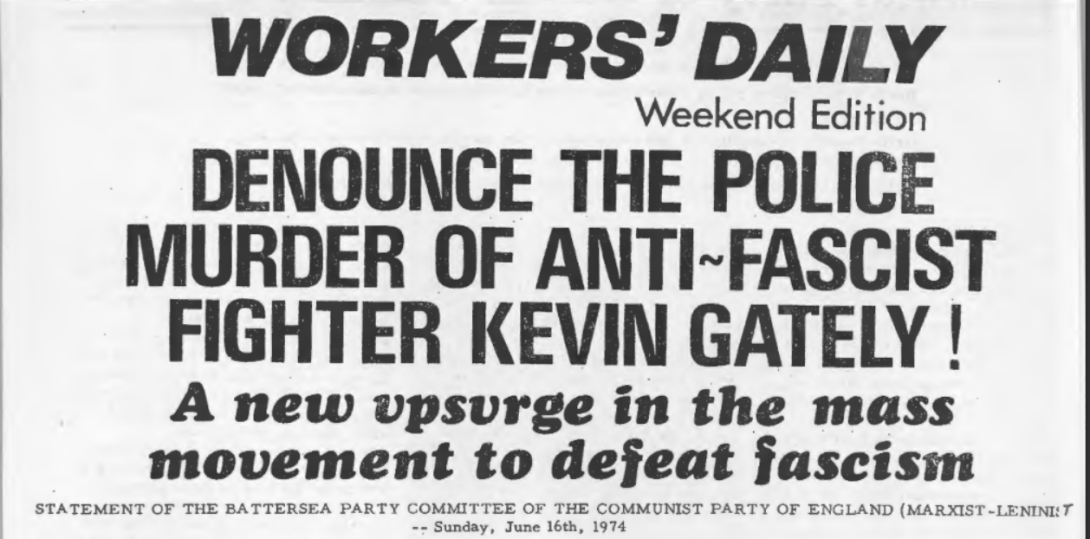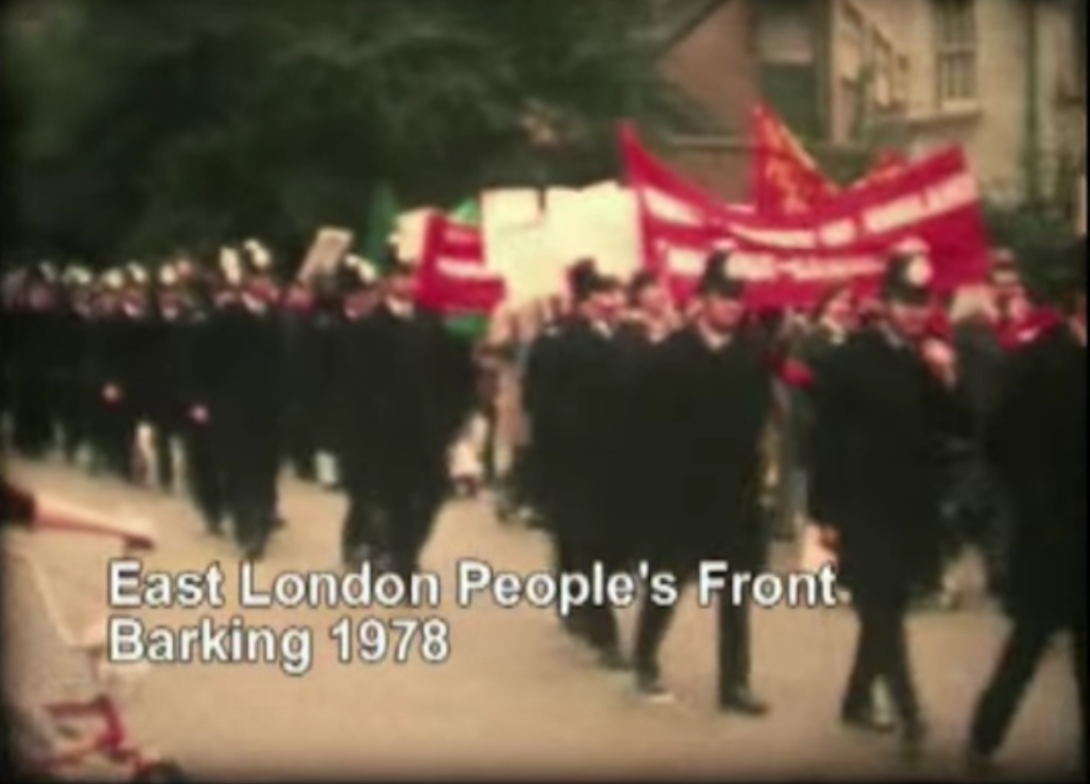The Communist Party of England Marxist-Leninist (CPE-ML) was a 'Maoist' or anti-revisionist party. The CPE (ML) had its origins in the Sussex University-based English Student Movement, part of a Hardial Bains-inspired tendency known as the Internationalists, and formed following their 'Necessity For Change' conference in 1967.
The Communist Party of England (Marxist-Leninist) was spied on by HN13 ‘Desmond “Barry” Loader’ between 1975 and 1978. CPE (ML) successor party , the Revolutionary Communist Party of Britain (Marxist-Leninist), was infiltrated later, between 1981 and 1985, by another SDS officer who used the alias HN19 ‘Malcolm Shearing’.
The CPE (ML) was often thought of as a Maoist party; however, current RCP (ML) chair Michael Chant says that the organisation initially embraced Maoist thought but later rejected it.
The party had a modest membership and never aimed to be a mass membership organisation. It had several front organisations, including the South London People’s Front, the East London People’s Front and the Progressive Cultural Association. These groups are listed in SDS annual reports as separate groups that had been infiltrated, even though they were not independent of the parent organisation.
History
In 1970, the English Internationalists changed its name to the English Communist Movement (Marxist-Leninist), and in 1972, the group founded the Communist Party of England (Marxist-Leninist). In the 1970s, it adopted a Maoist stance in addition to its Marxist-Leninist orientation.
In 1972, an essential facet of the party was ‘the struggle of the Irish people for freedom and independence, and activists were distributing and collecting signatures for a petition as part of this work’.
Around this time, the CPE (ML) had members across the UK, centred around south and east London and with a significant presence in Birmingham.
'No Platform' and anti-fascism
In the early 1970s, across higher-education campuses students protested against right-wing and fascist speakers. These incidents were a prelude to what became known as No Platforming such speakers.
One incident allegedly involved student members of the CPE (ML), mostly from Birmingham:
On 8 May 1973, psychologist Hans Eysenck, whose theories were rooted in the controversial eugenics movement, attempted to deliver a lecture at the London School of Economics but faced heavy protests from students. A group of Maoists stormed the stage and assaulted Eysenck.
The CPE (ML) was also vocal and active in broader anti-fascist politics during the 1970s and early 1980s, when the National Front was a significant force on the streets and sometimes at the ballot box. During this time, anti-fascist groups successfully challenged the NF on the street.
In 1974, CPE (ML) members were present at the Red Lion Square counter-fascist demo during clashes between anti-fascists and the police. During this violent confrontation, protester Kevin Gately received severe head injuries from which he died. Members of the party gave evidence at the subsequent public inquiry into the incident, which was chaired by Lord Scarman.

Confrontations with the police
In the 1970s, members of the CPE (ML) had several encounters with uniformed police. These incidents would have raised the group’s profile with the police – and specifically Special Branch.
Accounts from the time recall CPE (ML) members leafleting and being ‘brutally attacked’ by the police at a demonstration in East Street market in south-east London in 1972. Several CPE(ML) members received prison sentences. According to rival Marxist party, the Reg Birch-led Communist Party of Britain:
Last December [in 1972], some supporters of the Communist Party of England (Marxist‐Leninist) were attacked by the London police and planted with drugs, ammunition, explosives and have been committed to trial at the Old Bailey on concocted charges. Comrade [redacted name], an active supporter of the Communist Party of England (Marxist‐Leninist), is at present serving a five-year sentence on concocted charges of ‘malicious wounding’' and ‘assault’.
A further confrontation at East Street market inspired prominent avant-garde musician and party member Cornelius Cardew to write the song and piano piece, Four Principles on Ireland.

Later, in January 1974, four members of the party were found guilty of possession of petrol bombs and assaulting police.
Separately, in 1973-1974, several party members were also arrested for the fabricated charge of the theft of roof lead after their car was stopped on Queenstown Road in Battersea.
Commensurate with significant anti-fascist activity, there was a probable fascist attack on the election headquarters of the CPE (ML)-linked South London People's Front (SLPF) in the 1978 Lambeth Central by-election.
Barry Loader and CPE(ML)-related court cases
HN13 ‘Desmond “Barry” Loader’ was arrested in connection with public-order incidents involving the CPE (ML) and the National Front and twice appeared in court under his cover name.
On the first occasion, in September 1977, Loader appeared at Barking Magistrates Court, charged with threatening behaviour.
At the trial in April 1978 at Barking Loader, unlike five of his co-defendants, he was acquitted. This issue is explored in depth in the profile of HN34 Geoffrey Craft , whose intervention, briefing the court clerk that Loader was an undercover police officer, led to Loader being acquitted.
On 7 July 2023, the Inquiry referred the Barking convictions to its miscarriages of justice panel, in relation to former CPE (ML) member Barbara White. In May 2024, the Criminal Case Review Commission referred the case back to the courts, calling for the convictions to be quashed due to the undisclosed presence of the undercover officer having created an ‘abuse of process’.
Loader’s second court appearance came during the Brixton by-election on April 15, 1978, which had sparked clashes between anti-fascists and the National Front. Four CPE (ML) members were arrested, including Michael Chant, who also gave evidence to the Inquiry. He was convicted at Brixton Magistrates Court on June 29, 1978, for using ‘insulting behaviour’. Loader was also convicted of using threatening behaviour in this case.
Inquiry chair John Mitting thought it likely that the bench at Brixton had been deliberately misled, in each case, about the person and role of HN13.
Front Groups
The CPE-ML had an unusually large number of front groups. These included: The People’s Popular Front, The Albanian Society, West Indian Defence Committee, Indian Defence Committee, Ford Workers Committee, Irish Support and Friendship Committee, London Students Movement, Communist Youth Union of Britain and Outer East London Anti-Fascists.
All of these fronts are listed as separate targets on SDS annual reports, even though their membership would have been exclusively made up of those within the CPE-ML/RCPB-ML.
Sources
Evan Smith. No Platform: A History of Anti-Fascism, Universities and the Limits of Free Speech. 2020.
Revolutionary Communist Party of Britain (Marxist-Leninist). Website.
